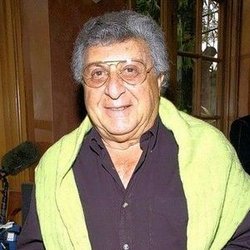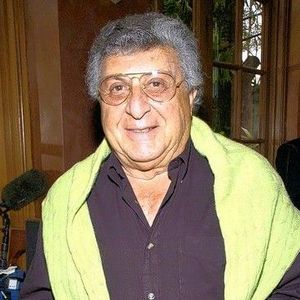Chirkinian died Friday at his home in North Palm Beach, Fla., after a long bout with lung cancer , his son told The Associated Press. He was surrounded by friends and family.
The television pioneer was elected to the World Golf Hall of Fame just last month, during an emergency vote after it became widely known he was undergoing treatment for cancer . He will be inducted posthumously on May 9 in St. Augustine, Fla., in the lifetime achievement category.
"He squeezed every drop of life out of his 84 years," his son, Frank Chirkinian Jr., said during a phone interview. "I don't think there was anything left."
Described as street-wise and direct, Chirkinian had said recently that getting into the Hall of Fame was the apex of his career — and what a robust career it was.
He produced the first PGA Championship in 1958, at Llanerch Country Club near his home in Philadelphia, and two years later the first televised Winter Olympics from Squaw Valley. He also dreamed up the idea of putting cameras on blimps to cover college football games.
But it was his work in golf that stood out, and at Augusta National in particular.
He produced 38 editions of the Masters for CBS, bringing the majestic fairways and greens of Augusta to fans who could only dream of seeing them in person.
"Frank Chirkinian was a visionary in every sense of the word," PGA Tour commissioner Tim Finchem said. "He was an artist. The sport of golf was presented on television to generations of fans in innovative, imaginative and entertaining ways because of Frank."
Chirkinian introduced high-angle cameras and new angles, put roving reporters on the grounds, and made sure to capture the unique blend of sounds — the club hitting the ball, the ball falling into the cup — that came to define modern golf coverage. He even changed the way scores were delivered, according to par rather than by total.
He could be friendly and agreeable, but also surly and demanding — announcer Pat Summerall gave him the nickname "The Ayatollah" in the late 1970s, when the Shah of Iran was deposed and replaced by Khomeini. It was a name that Chirkinian acknowledged he enjoyed.
"He was a friend, a mentor and a father figure to me," broadcaster Jim Nantz said. "I was blessed to have his guiding hand extended to me at the age of 26. I am comforted knowing, as long as there is golf being televised anywhere in the world, Frank Chirkinian lives."
Chirkinian left his imprint on many of golf's defining moments, from the duels between Arnold Palmer and Jack Nicklaus that defined the 1960s and '70s, to the Golden Bear's back-nine charge to win the 1986 Masters. He called Augusta National "the greatest theater in sports."
He retired from CBS in the late 1990s, but could still be found on the golf course.
"Frank Chirkinian was a true pioneer," said Dick Ebersol, chairman of NBC Sports. "There certainly would not have been a golf television business without him. And golf may never have developed into such a robust business without the way he connected the game on the course to the viewer at home. He will be sorely missed but the game is better forever because of him."
Critics recognized his passion and devotion by awarding him five Emmys and a Peabody during his career. He also was inducted into the Sports Broadcasting Hall of Fame.
"The golfing world lost a great ambassador to the game," said Lance Barrow, coordinating producer of golf and the NFL for CBS Sports. "He did as much for the game as anyone who has ever been associated with golf. His legacy will live on forever."
That's why, when word spread that he was undergoing cancer treatment, the Hall of Fame board — including members of the PGA Tour, LPGA, PGA of America and European Tour — held an emergency vote last month to elect him alongside Ernie Els, Doug Ford, Jumbo Ozaki, Jock Hutchison and George H.W. Bush. Those five were elected last September.
Chirkinian had hoped to make the induction in May, and his son said he taped an acceptance speech that will be played during the ceremony. His family plans to attend in his honor.
"I think it really brightened his last few days," Frank Chirkinian Jr. said. "I think this was kind of the crowning achievement for his career."
----------
Former CBS golf producer Frank Chirkinian, whose efforts turned the Masters into one of the highest-rated events in sports TV, died Friday, March 4, in North Palm Beach, Fla, of lung cancer. He was 84.
Chirkinian was elected to the World Golf Hall of Fame during an emergency vote last month after his illness became widely known. He also received four Emmys.
The TV pioneer produced the first PGA Championship in 1958 and produced the first televised Winter Olympics, from Squaw Valley, in 1960. He is also credited with the innovation of using blimps to cover college football games.
But he was particularly noted for his work in golf and at Augusta National in particular, producing 38 consecutive editions of the Masters for CBS. He introduced new angles from which to cover golf, had reporters roaming the grounds and believed capturing the sounds of golf, from the clink of the ball in the hole to the chatter between golfers and caddies, with microphones was key. These innovations came to define golf coverage as it is produced today.
Chirkinian grew up in Philadelphia and left the U. of Pennsylvania to take a job as an assistant director at local CBS station WCAU-TV.
He retired from the network in the late 1990s.
He is survived by his wife, Mary Jane, and a son.
Chirkinian died Friday at his home in North Palm Beach, Fla., after a long bout with lung cancer , his son told The Associated Press. He was surrounded by friends and family.
The television pioneer was elected to the World Golf Hall of Fame just last month, during an emergency vote after it became widely known he was undergoing treatment for cancer . He will be inducted posthumously on May 9 in St. Augustine, Fla., in the lifetime achievement category.
"He squeezed every drop of life out of his 84 years," his son, Frank Chirkinian Jr., said during a phone interview. "I don't think there was anything left."
Described as street-wise and direct, Chirkinian had said recently that getting into the Hall of Fame was the apex of his career — and what a robust career it was.
He produced the first PGA Championship in 1958, at Llanerch Country Club near his home in Philadelphia, and two years later the first televised Winter Olympics from Squaw Valley. He also dreamed up the idea of putting cameras on blimps to cover college football games.
But it was his work in golf that stood out, and at Augusta National in particular.
He produced 38 editions of the Masters for CBS, bringing the majestic fairways and greens of Augusta to fans who could only dream of seeing them in person.
"Frank Chirkinian was a visionary in every sense of the word," PGA Tour commissioner Tim Finchem said. "He was an artist. The sport of golf was presented on television to generations of fans in innovative, imaginative and entertaining ways because of Frank."
Chirkinian introduced high-angle cameras and new angles, put roving reporters on the grounds, and made sure to capture the unique blend of sounds — the club hitting the ball, the ball falling into the cup — that came to define modern golf coverage. He even changed the way scores were delivered, according to par rather than by total.
He could be friendly and agreeable, but also surly and demanding — announcer Pat Summerall gave him the nickname "The Ayatollah" in the late 1970s, when the Shah of Iran was deposed and replaced by Khomeini. It was a name that Chirkinian acknowledged he enjoyed.
"He was a friend, a mentor and a father figure to me," broadcaster Jim Nantz said. "I was blessed to have his guiding hand extended to me at the age of 26. I am comforted knowing, as long as there is golf being televised anywhere in the world, Frank Chirkinian lives."
Chirkinian left his imprint on many of golf's defining moments, from the duels between Arnold Palmer and Jack Nicklaus that defined the 1960s and '70s, to the Golden Bear's back-nine charge to win the 1986 Masters. He called Augusta National "the greatest theater in sports."
He retired from CBS in the late 1990s, but could still be found on the golf course.
"Frank Chirkinian was a true pioneer," said Dick Ebersol, chairman of NBC Sports. "There certainly would not have been a golf television business without him. And golf may never have developed into such a robust business without the way he connected the game on the course to the viewer at home. He will be sorely missed but the game is better forever because of him."
Critics recognized his passion and devotion by awarding him five Emmys and a Peabody during his career. He also was inducted into the Sports Broadcasting Hall of Fame.
"The golfing world lost a great ambassador to the game," said Lance Barrow, coordinating producer of golf and the NFL for CBS Sports. "He did as much for the game as anyone who has ever been associated with golf. His legacy will live on forever."
That's why, when word spread that he was undergoing cancer treatment, the Hall of Fame board — including members of the PGA Tour, LPGA, PGA of America and European Tour — held an emergency vote last month to elect him alongside Ernie Els, Doug Ford, Jumbo Ozaki, Jock Hutchison and George H.W. Bush. Those five were elected last September.
Chirkinian had hoped to make the induction in May, and his son said he taped an acceptance speech that will be played during the ceremony. His family plans to attend in his honor.
"I think it really brightened his last few days," Frank Chirkinian Jr. said. "I think this was kind of the crowning achievement for his career."
----------
Former CBS golf producer Frank Chirkinian, whose efforts turned the Masters into one of the highest-rated events in sports TV, died Friday, March 4, in North Palm Beach, Fla, of lung cancer. He was 84.
Chirkinian was elected to the World Golf Hall of Fame during an emergency vote last month after his illness became widely known. He also received four Emmys.
The TV pioneer produced the first PGA Championship in 1958 and produced the first televised Winter Olympics, from Squaw Valley, in 1960. He is also credited with the innovation of using blimps to cover college football games.
But he was particularly noted for his work in golf and at Augusta National in particular, producing 38 consecutive editions of the Masters for CBS. He introduced new angles from which to cover golf, had reporters roaming the grounds and believed capturing the sounds of golf, from the clink of the ball in the hole to the chatter between golfers and caddies, with microphones was key. These innovations came to define golf coverage as it is produced today.
Chirkinian grew up in Philadelphia and left the U. of Pennsylvania to take a job as an assistant director at local CBS station WCAU-TV.
He retired from the network in the late 1990s.
He is survived by his wife, Mary Jane, and a son.
Sponsored by Ancestry
Advertisement
Advertisement




